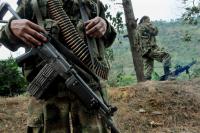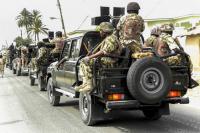-
Case study offers insights for more effective countering violent extremism (CVE) campaigns
New research offers insights into the psychological motives and mechanisms that radicalize a person to commit violence. The new study takes a detailed look at Momin Khawaja, a convicted terrorist who was arrested in 2004 in connection to a U.K. bomb plot, and offers some possible implications for countering violent extremism (CVE). The researchers argue that in addition to fitting a “caring-compelled” profile of lone-actor terrorists, Khawaja is an early example of a Western foreign fighter.
-
-
U.S. destroys large ISIS chemical weapons manufacturing facility
The U.S. on Monday destroyed an ISIS chemical manufacturing facility in Iraq, which posed a “significant chemical [weapons] threat.” Footage of Monday air strikes showed twelve aircraft hitting a sprawling industrial site in Mosul. The hits were followed by huge explosions in multiple buildings and storage facilities. The buildings were quickly engulfed by flames, and heavy plumes of dark smoke rose into the air. USAF spokesman said that fifty individual targets were hit in the attack.
-
-
U.S. spending on war on terror since 9/11 to reach $4.79 trillion in 2017

In 2002, Lawrence Lindsey, George W. Bush’s chief economic adviser, estimated that the cost of waging war in Iraq would not exceed $200 billion. As the fifteenth anniversary of the 9/11 attacks approach, the United States has spent or taken on obligations to spend more than $3.6 trillion in current dollars on the wars in Iraq, Afghanistan, Pakistan, and Syria and on the Department of Homeland Security. The total expenditure for the wars in the Middle East and the war on terror rises to $4.79 trillion when dedicated war spending for the coming fiscal year is added in, along with the nearly $32 billion requested for the Department of Homeland Security for 2017.
-
-
Command under attack: What we’ve learned since 9/11 about managing crises
Major disasters pose difficult challenges for responders on the ground and for higher-level officials trying to direct operations. Some events are novel because of their scale, while others involve challenges that no one may ever have envisioned. Communities need to bring their response agencies together regularly to plan and practice. This can develop and maintain knowledge and relationships that will enable them to work together effectively under the high stress of a future attack or disaster. Any community can do this, but many have not. Where training and practice have taken place, these tools have worked. They can be improved, but the most important priority is getting more communities to practice using them more regularly, before the next disaster. One important way this nation can honor the victims of 9/11 is by using these lessons to create the conditions for even better coordination in future events.
-
-
ISIS instructs soccer referees in Syria to enforce Sharia laws, not FIFA rules
ISIS has outlawed soccer referees in its Syrian strongholds because they implement the rule set by FIFA (the world governing soccer federation) “in violation of the commands of Allah.” Local ISIS commanders had drawn up a list of Sharia-inspired soccer rules detailing, for example, how players who were injured during a game can be compensated by their opponents.
-
-
U.S., Israel sign record 10-Year, $38 billion defense package
After nearly a year of negotiations, Israel and the United States have signed a record $38 billion, 10-year military aid package. The deal is “the single largest military assistance package — with any country — in American history,” American ambassador to Israel Dan Shapiro said
-
-
15,000 French citizens are in the process of being radicalized: French PM
France’s prime minister Manuel Valls warned on Sunday that some 15,000 French citizens could be in the process of being radicalized. His warning came a day after the police arrested a 15-year-old boy at his Paris home in order to thwart a planned weekend terrorist attack.
-
-
Hundreds of children under 10 in the U.K. were “at risk of extremism” last year
In just one year, the U.K. government’s Channel de-radicalization program has received reports of more than 350 children under the age of 10 who were “at risk of extremism.” The Channel program earmarks such youngsters for mentoring by program’s specialists. In total, 4,611 people were referred to the program between June 2015 and June 2016 — a 75 percent increase compared with the previous year, when there were 2,632 referrals.
-
-
FARC rebels apologize for kidnapping 27,000 Colombians

In a video recording released late Sunday, Colombia’s Marxist FARC rebels have apologized for the “great pain” they caused by kidnapping thousands of people and holding them for ransom to fund their 52-year war against successive Colombian governments. Official figures show that some 27,000 people were kidnapped between 1970 and 2010. In addition to kidnapping, the FARC used extortion and the drug trade to finance its campaign. On 24 August the leadership of the FARC igned a formal agreement with the Colombian government to put an end to South America’s longest war.
-
-
Fitness trackers found to have serious security flaws

They may look like a normal watch but are capable to do much more than just showing the time: So-called fitness trackers are collecting data on their users’ lifestyle and health status on a large scale helping them with training or losing weight. Researchers have investigated fraud opportunities with fitness trackers and detected serious security flaws.
-
-
N. Korea’s test of miniaturized warhead, submarine-launched ballistic missile, are game changers
North Korea has conducted its fifth nuclear test last night, marking the 68th anniversary of the nation’s founding. Military analysts say the test shows a worrisome improvement in North Korea’s nuclear capabilities: It was the most powerful nuclear test to date, with a 10-kiloton yield – slightly smaller than the yield of the bomb dropped on Hiroshima, estimated to have been between twelve and eighteen kilotons. The warhead tested in the explosion was miniaturized, indicating that North Korea now has the capability to mount a nuclear warhead on a missile. Last night’s test, together with North Korea’s proven progress in launching ballistic missile from submarines, mean that the country is getting closer to possessing a nuclear arsenal capable of hitting the United States.
-
-
Boko Haram embroiled in deadly in-fighting between rival factions vying for control

Nigerian Islamist group Boko Haram, already reeling under the combined military pressure of Nigeria, Niger, Chad, and Cameroon, and facing a growing wave of desertion from its ranks, is now also being hobbled by in-fighting between rival factions. The rift began in early August, when ISIS announced that Abu Musab al-Barnawi was the group’s new leader, replacing Abubakar Shekau, who had led the group since 2009. Shekau defied ISIS and announced he was still the leader – and the two factions have been locked in deadly skirmishes for four weeks now.
-
-
Report: Hamas spends $100 million annually to build up its military infrastructure
Hamas spends an annual $100 million on its military infrastructure in order to prepare for its next war against Israel. Roughly $40 million is spent on employing around 1,500 diggers to build the Iran-backed terror organization’s network of tunnels. Despite the financial hardships experienced by Gaza residents, Hamas, which in 2014 had a budget of around $530 million, is intent on increasing its military spending. In addition to digging tunnels, it hopes to upgrade its capabilities, which were degraded during its war with Israel two years ago, and is seeking to develop more precise rockets that could evade Israel’s Iron Dome defensive shield.
-
-
Israel building underground wall around Gaza to foil Hamas’s tunnel digging

Israel has begun work on a deep underground wall along its border with the Gaza Strip in order to prevent Hamas from digging cross-border tunnels into Israel. The barrier will run about 37 miles along the border with Gaza, and be equipped with sensors. The Gaza Strip, where about 1.8 million Palestinians live, is already surrounded by a sophisticated system of walls, fences, sensors, and a military patrol road – and the new structure will extends these barriers underground.
-
-
Car filled with gas cylinders near Notre Dame cathedral part of a terror plot
The French security services are looking for a young woman after a car carrying seven gas cylinders was discovered Saturday parking near Notre-Dame cathedral in Paris. The car was found on a Seine riverside stretch called the Quai de Montebello, only meters from the cathedral. The father of the missing 19-year old – himself on the French intelligence services’ terror watch list – informed the police that his daughter, who was being monitored by the police for expressing her desire to go to Syria to join ISIS, had disappeared with his car.
-
More headlines
The long view
Preventing Another 'Jan. 6' Starts by Changing How Elections Are Certified, Experts Say
The 2024 presidential election may be a rematch between President Joe Biden and former President Donald Trump, but preventing a repeat of Jan. 6, 2021 — when false claims of a stolen election promoted by Donald Trump and his allies led to an insurrection at the U.S. Capitol —will be top of mind this election year. Research finds broad support among public for nonpartisan certification commissions.
States Rush to Combat AI Threat to Elections
This year’s presidential election will be the first since generative AI became widely available. That’s raising fears that millions of voters could be deceived by a barrage of political deepfakes. Congress has done little to address the issue, but states are moving aggressively to respond — though questions remain about how effective any new measures to combat AI-created disinformation will be.
Chinese Government Hackers Targeted Critics of China, U.S. Businesses and Politicians
An indictment was unsealed Monday charging seven nationals of the People’s Republic of China (PRC) with conspiracy to commit computer intrusions and conspiracy to commit wire fraud for their involvement in a PRC-based hacking group that spent approximately 14 years targeting U.S. and foreign critics, businesses, and political officials in furtherance of the PRC’s economic espionage and foreign intelligence objectives.
European Arms Imports Nearly Double, U.S. and French Exports Rise, and Russian Exports Fall Sharply
States in Europe almost doubled their imports of major arms (+94 per cent) between 2014–18 and 2019–23. The United States increased its arms exports by 17 per cent between 2014–18 and 2019–23, while Russia’s arms exports halved. Russia was for the first time the third largest arms exporter, falling just behind France.
LNG Exports Have Had No Impact on Domestic Energy Costs: Analysis
U.S. liquified natural gas (LNG) exports have not had any sustained and significant direct impact on U.S. natural gas prices and have, in fact, spurred production and productivity gains, which contribute to downward pressure on domestic prices.
